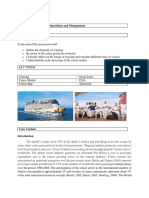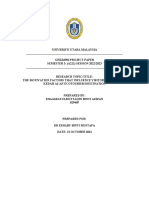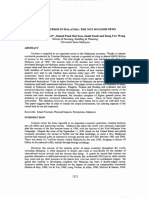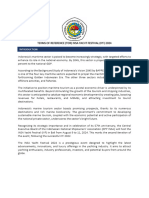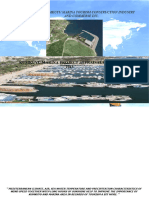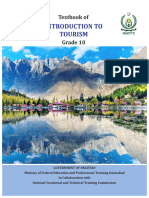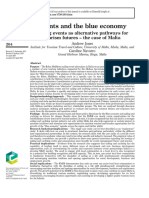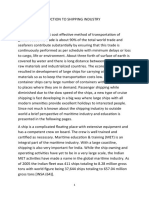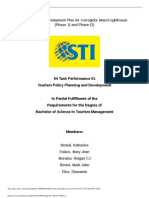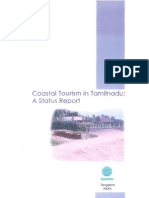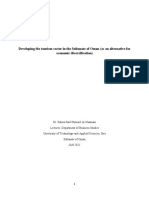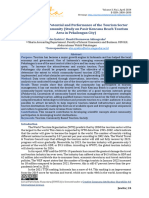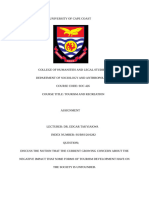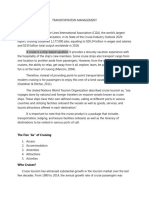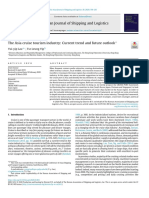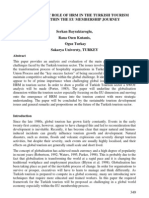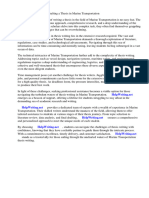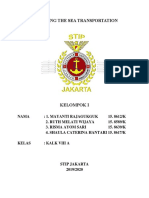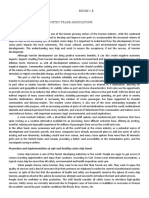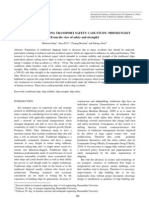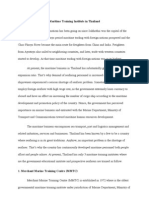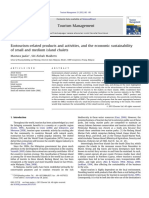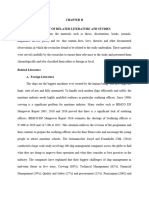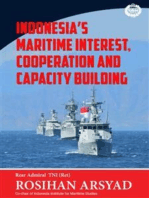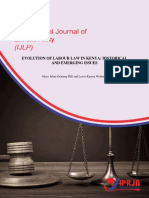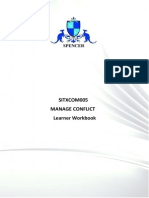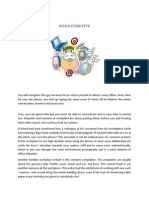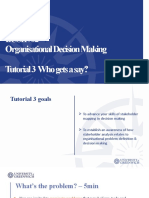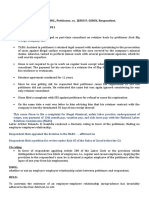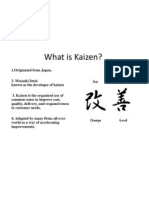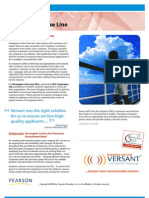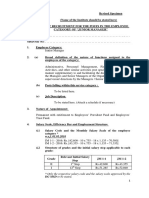Yacht Tourism in Turkey
Yacht Tourism in Turkey
Uploaded by
andjeomajkinCopyright:
Available Formats
Yacht Tourism in Turkey
Yacht Tourism in Turkey
Uploaded by
andjeomajkinCopyright
Available Formats
Share this document
Did you find this document useful?
Is this content inappropriate?
Copyright:
Available Formats
Yacht Tourism in Turkey
Yacht Tourism in Turkey
Uploaded by
andjeomajkinCopyright:
Available Formats
YACHT TOURISM EDUCATION: A STUDY ON CURRICULUMS
Derya ATLAY IIK 1 , A. Gldem CERT 2 Mula University Dalaman Vocational School Atakent Mah.Gazi Bulvar Dalaman 48770 Mula, Turkey Phone: +90 252 697 65 25 / 122 Fax: +90 252 697 63 45 deryaatlay@mu.edu.tr 2 Dokuz Eyll University School of Maritime Business amd Management Tinaztepe Campus Buca 35160, Izmir, Turkey Phone/Fax: +90 232 453 4992, gcerit@deu.edu.tr ABSTRACT Yacht tourism is a type of tourism that generally consists of yachters, yacht building industry, marinas and yachting companies. Yachting tourism, being a part of marine tourism, tends to play a part in the tourist activities and provides important resources for the general economy. In the chain of goods and services necessary to allow the consuming public to enjoy boating, marinas are the absolute focal points. Without them, use of the water would be severely limited and enjoyment even less.
1
Yacht tourism is a recreational tourism product which gives chance to explore the underwater archaeological ruins and the attractive natural panoramas of the bays and the islands. Yachting pulls the people off the crowd and noise of the city and makes people relax and refresh by fishing, swimming in the beautiful calm sea and scuba diving. It is not right to see the yacht tourism as a sea basis, because while yachting the tourists would also like to visit the shore towns, cultural and historic places and go shopping, interact with local people. Today, recreational boating around the world is enjoyed in many different ways: deep sea cruising, inland river and canal boating, offshore fishing, water skiing, jet skiing, canoeing, and kayaking and rafting, among others. There are several kinds of jobs in the yacht tourism industries. Some of these jobs are related to yacht directly such as yacht designer, marine technician, yacht masters, competent crew, and the others are related to marinas such as marina manager, dockmaster, operations manager, bookkeeper, cashier, ships store manager, office and store clerk, marina maintenance manager, custodian, ground keeper, maintenance supervisor, maintenance worker, marina security chief and officer. It is crucial to state that there are many schools, private certification programs, courses or instructions to meet the needs of employment for these mentioned jobs. On the other hand yachting business companies are seeking employees who are experienced at boats and yachts chartering however, this is interpretable as gap for yacht business education. This paper evaluates the education requirements of yacht tourism industries generally. The key purpose is seen to be the preparation of graduates for a career in yacht tourism, however there is only few programs which offer a balance of vocational and academic development to achieve this aim. So this paper stands on vocational education of yacht tourism internationally and analyzes the existing situation in contemporary yacht tourism education and attempts to give an approach for curriculums generally. Keywords: Yacht Tourism, Vocational Education, Yacht Tourism Curriculums, Turkey 1. INTRODUCTION Tourism has very important positive effects on developed and developing countries in view of economical, political, cultural and social lives. Marine tourism takes a great share in the general tourism activities. The demand for yachting is increasing because of its features: it satisfies the feelings of freedom, being close to nature and history, sports and adventure, exploration (Kalemdarolu, 2007). Yacht tourism is defined in the Turkish Yacht Tourism Master Plan as all the tourist activities happened to be in the period of arriving of the tourist to the yacht and departing from the yacht after a specific travel (Ministry of Tourism, 1992). It is also possible to define the yacht tourism as various tourist activities including relaxation, recreation and travel or sportive purposes of domestic or foreign tourists executed by a private yacht or a commercial yacht rented. Today, recreational boating around the world is enjoyed in many different ways: deep sea cruising, inland river and canal boating, offshore fishing, water skiing, jet skiing, canoeing, and kayaking and rafting, among others (Stone, 2000).
585
When yacht tourism is analyzed it seems to be a field of study in which the two sectors are combined, where sometimes maritime management or tourism predominates. Yachting concerns maritime area managing marine transportation vehicles, sea transportation of people aiming vacation, entertainment and sports, the service personnel being sea man and concerns tourism management by being a service organization related to tourism. Briefly, a definition for maritime management focused on tourism sector will be more accurate. Therefore naturally yacht tourism keeps to develop problematically as a result of being the combination of two sectors (Atlay and Cerit, 2007). Yacht tourism is composed of private yachting. Private yachtsowners are both local owners and cruiser owners. Local owners moor their own yachts in nearest marina and sail at weekends. Cruiser owners have more convenient time to sail and cruise. Generally they give months to cruise in foreign seas and leave yachts in a marina so as to park for winter. Other groups of yacht tourists are charterers. They rent a yacht or a cabin for certain time from Yacht Charter. There are two important cruising areas in the world: The Caribbean Sea and The Mediterranean Sea. They both have convenient winds to sail, climate, rich natural and cultural beauties, etc. But they are not competitors to each other because of the distance between them and the season order. The Mediterranean Sea is very much suitable for yachting, because of climate and winds convenient to sail, its natural small bays and different cultures and history of surrounding countries (Kalemdarolu, 2007). Yachting in the Mediterranean Sea, with the average of 800.000 yachts traveling every year, is developing in a route starting from West Mediterranean to East Mediterranean. Especially in the recent years the increase in the West and East Mediterranean marinas, the attainment of sea pollution to high extent, the desire to travel different places has made the yacht tourism shift from the West Mediterranean to the East Mediterranean countries. Especially Israel, Northern Cyprus and Turkey are the lucky countries that can benefit from the potential of yacht tourism in the East Mediterranean (Hraca, 1996). Both common sense and economic research support the idea that the quality of a nation's work force is important to economic growth and social development. Two factors are generally considered to be the prime determinants of the quality of a work force. One is labor productivity, or the value of the goods and services produced by a worker. The second is the flexibility of the work force, or the ability of workers to move across sectors of the economy and between industries as the structure of the economy changes (Middleton et al, 1996). In the last hundred years, vocational education has evolved from its original inception in response to changes in society, technology, education and education philosophy, and the workplace. At the dawn of the 21st century, vocational, or career and technical, education goes far beyond the specific technical knowledge and skills required for a particular occupation; today, vocational education encompasses not only technical preparation but also sound academic foundations, higher-order thinking skills, and personal qualities needed for success in the workplace (Xing, et al, 2008). From this view of point, yacht tourism is a challenge for Turkey in terms of its economic development process. As the other industries yacht tourism needs qualified and skilled workers, too. Because yacht tourism gives standard services to people who are requiring services of high quality, it needs well educated personnels. For example, marinas, a main substructure of yacht tourism, are service providers to yachts with their skilled management. Vocational education is a modern educational development and today, vocational education encompasses not only technical preparation but also sound academic foundations, higher-order thinking skills, and personal qualities needed for success in the workplace (Xing, et al, 2008). It is essential to give vocational education at the college level for students whether the special requirements of the yacht tourism industry or providing the professional adequancies of students for the industry. So statement of the educational needs of the yacht tourism industry would help to develop the most suitable curriculum alternatives for each vocational education levels. This approach is evaluated within the vocational education in Turkey. In this paper firstly yacht tourism is analysed in terms of its educational needs. Then the vocational educations situation in Turkey is evaluated. To develop a curriculum for the yacht tourism industries, alternative context of yacht tourism is examined and at the end of the study samples of curriculum for yacht tourism education are proposed. 2. YACHT TOURISM AND ITS EDUCATIONAL NEEDS Yacht tourism means the type of tourism consisting of yacht management, yachter, yacht manufacture and yacht harbor(Kalemdarolu, 2007). Each categories have several kinds of job alternatives and creates significant direct and indirect employment. Especially for yacht building industries there is a big potential for employees. However, educational requirements of yacht managemet and yachting is being subject of this
586
study, because sprecialised requirements of yacht building is different from business and management areas of yacht tourism. Marinas are service providers of yachts. So marinas could be evaluated as a main substructure of yacht tourism. According to ICOMIA (International Council of Marine Industry Association) marina may be defined as any facility, shoreside or in the water, whose primary function is the wet or dry storage of recreational watercraft (ICOMIA, 2008). Marinas are divided as safety sea areas in which yachtsmen can moor, maintain their own yacht, go on shopping, take a bath, wash clothes, pump in oil, eat, drink, communicate, etc. A well equipped marina should give these services to yachtsmen and other customers (Kalemdarolu, 2007). A full-service marina may include laundry, restrooms, vending machines, ships store, yacht brokerage, boat cleaning, valet parking, restaurant, crew quarters, clubhouse or administration building, swimming pool, childrens playground, fuel ice, a boat sewage pump-out facility, cable TV, telephone connections, water and full electric power hookups (ICOMIA, 2008). According to Raviv (1996), a modern marina could have safe moorings, good service, skilled management, dry dock, shipyard, maintenance and security, yachting club, good restaurants, ample parking, repair of marina equipment, gasoline for boats, chandleryand. Today, the most important mission of a marina is to make young people love sea, make the second generations retirement time more pleasant and more healthy, make the people that are depressed from the stress of the business life relax and create an ambiance for entertainment, sports and social activities. Namely, a modern marina is an establishment to protect sea vessels and seaman from natural disasters and on the other side it is a place that gathers people from different nations, languages and religions in peace. A marina is also a business place that provides foreign exchange to the country as the heart of the nautical tourism and it is a symbol of civilization for the coasts (Eri and Krant, 2005). Training in common business management skills is readily available for those that want it. Schools at the university level and pre-university level, community colleges, and trade schools offer courses in accounting, finance, computers, employee management, leadership, supervisory skills and customer service. But there is a necessity to meet specialized employment requirements of yachting and yacht business areas. From this view of point, vocational education gets huge importance to cover the gap of the yacht tourism education. 2.1. Vocational Education and Its Evolution in Turkey Developing countries need to improve productivity throughout their economies if they are to compete successfully in an era of rapid economic and technological change. Improved productivity requires not only capital investment, but also a work force that has the flexibility to acquire new skills for the new jobs created as the structures of economies and occupations change. The level of competence of a country's skilled workers and technicians is a key determinant of labor force flexibility and productivity. Skilled workers and technicians enhance the quality and efficiency of product development, production, and maintenance, and they supervise and train workers with lesser skills. They are found in the modern wage sector, in agriculture, and in the small unregulated enterprises of the informal sector, both rural and urban (Middleton et al, 1996). Vocational education is a relatively modern educational development. Until the 19th century, such education was provided only through apprenticeship. With the growth of industrialization during the 19th century, however, several European countries began introducing vocational education in elementary and secondary schools, and it was established in Great Britain in the 20th century. By the late 19th century, public school vocational education in the United States consisted of manual training and practical arts. These programs were gradually expanded until 1917 when Federal aid was provided to public schools for trade and industrial, agricultural, and homemaking courses. After World War II, the demand for trained professionals in the relatively new fields of computer science, electronics, and medical services led to an increased interest in short-term postsecondary specialized training programs in these areas as an alternative to a traditional college education (Xing, et al, 2008). Turkey is a developing country where the population is increasing rapidly. A high rate of increase in the young population and inadequate quota for university education led the Turkish Government to invest more in vocational education at the secondary level. As a result, training of the manpower became one of the crucial goals of the educational system. Vocational education is considered efficient as long as it meets the needs of the students and the industry. Students need quality education in order to meet competency levels required by the workplace. From vocational education, industry expects quality training in priority skills for their future workers. For the last decade, public vocational high schools in Turkey have been subjected to substantial criticism for the lack of sufficient skills and knowledge in their graduates required by the industry.
587
Employers are not satisfied with the quality of the graduates and are not willing to hire them. Graduates complain about the inadequacy of training in schools and the difficulty of finding a satisfying job in their specialization (Yldrm and imek, 2007). Vocational high schools, traditionally praised for their contribution to well-trained manpower for industry, are becoming less-preferred educational institutions for middle school graduates. Before evaluating the structure of vocational education in Turkey, theres a need to mention on Turkish Education System generally. The Turkish National Educational System is composed of two main sections; formal education and non-formal education in accordance with Basic Law No. 1739 for National Education. Formal education means the school system and comprises the institutions of preschool education, primary education, secondary education and higher education. Non- formal education includes all the activities organized outside or alongside the school. General high schools are educational institutions that prepare students for institutions of higher learning. They implement a four-year program over and above primary education, and comprise students in the 15-18 year age group. Vocational and technician high schools in Turkey offer four-year programmes which are designed to train skilled workers and technicians respectively. There are also the so called Anatolian Vocational and Technician Schools, which require an additional preporatory year because most of the instruction is given in a foreign language, usually English. Additionally, a number of non-formal institutions provide vocational training (Republic of Turkey Ministry of National Education MONE, 2005). The vocational and technical education system in Turkey includes two main dimensions: theoretical (school training) and practical (incompany training). Vocational training policies and activities are mostly carried out by MONE within the framework of Law No. 3308, which came into force in 1986 and Law No. 4702 of 2001, which brought about changes to the system, establishing strong new links of co-operation with industry and commerce. The vocational education system includes(OECD, 2007): Vocational and technical high schools providing training in more than 130 occupations and giving access or leading to the qualification of specialised worker and technician. Apprenticeship training, a combination of mainly practical training in enterprises and theoretical training in vocational education centres. Non-formal education, which is defined as the education, training and guidance provided for those who have never entered the education system or who dropped out without achieving any level of qualification. Nonformal education can be provided primarily through vocational education centres. Following the restructuring of secondary education announced in May 2005, the duration of education at all high schools was lengthened to at least four years beginning in the 2005/06 academic year without any preparatory year. In addition, the duration of Anatolian technical high schools will be five years, including a preparatory year and four years of the main secondary curriculum. Some public and private high schools providing education for five years including one-year preparatory classes will retain their status if they choose to do so. Vocational and technical secondary education includes at least 19 different kinds of schools in addition to vocational education centres, open education and special private schools and schools linked to ministries other than MONE. MONE is responsible for oversight of all vocational and technical schools whether or not they are under the jurisdiction of MONE. Vocational and technical high schools can be grouped in five categories: Technical high schools for boys: affiliated with the Directorate General of technical education for boys: Anatolian technical high schools, technical high schools, Anatolian vocational high schools, industrial vocational high schools and multi-programme high schools, and vocational education and technical training centres; Technical high schools for girls: affiliated with the General Directorate of Technical Education for Girls: Anatolian technical high schools for girls, technical high schools for girls, Anatolian vocational high schools for girls, vocational high schools for girls, multi-programme high schools, vocational and technical training centres, technical education maturity institutes for girls and practice arts schools for girls; Trade and tourism schools: Trade vocational high schools, Anatolian trade vocational high schools, Anatolian hotel management and tourism vocational high schools, Anatolian communications vocational schools, and multi-programme high schools;
588
Imam and preachers high schools: Imam-Hatip high schools, Anatolian Imam-Hatip high schools, Imam- Hatip high schools focused on foreign language, and open education; Health vocational high schools: The graduates of Anatolian Vocational High Schools and Anatolian Vocational High Schools for Hotel Management and Tourism would be candidates of yacht tourism vocational schools. In Turkey, the higher education includes all the educational institutions after secondary education, which provide at least two years of higher education and educate students for associate's, bachelor's, master's or doctorate degree levels. Institutions of higher education consist of universities, faculties, institutes, schools of higher education, conservatories, vocational schools of higher education and application-research centers. The purpose of higher education is to train manpower within a system of contemporary educational and training principles to meet the needs of the country. It provides high level specialized education in various fields for students who have completed secondary education. Universities comprising several units are established by the state and by law as public corporations having autonomy in teaching and research. Furthermore, institutions of higher education, under the supervision and control of the state, can also be established by private foundations in accordance with procedures and principles set forth in the law provided that they are non-profit in nature. In more recent years, there is a steady increase of interest among high school students in taking courses in vocational education. The data from the Ministry of Education and Turkish Statistic Institution show the position of vocational and technical high schools. According to Table 1 the rise of students enrolled is 337.843 through six years (Republic of Turkey Ministry of National Education -MONE, 2007).
Table 1: Numbers of School/unit, Enrollment and Graduate in Vocational and Technical High Schools and Educational Year
Source: Republic of Turkey Ministry of National Education -MONE, 2007 Vocational education gets more important place during the adaptation process of Turkey to the European Union. One of the examples of this is Modernisation of Vocational Education and Training in Turkey Project (MVET) funded by the European Union MEDA program. The overall goal of the project is to further modernize and adapt the system to make vocational education and training more responsive to the socioeconomic needs of the country and to the key principles of life-long learning. The MVET PROJECT is a vital component in improving the quality and relevance of the Turkish Vocational Education Training (VET) system (http://www.meb.gov.tr, 09.08.2008). While evaluating the educational needs of yacht tourism, both yachting business and marina management positions get the main place for skilled and knowledgable pernonnel requirements. For example, marina management requires a different set of skills because of a significant leisure activity in the developed world. In the early years managing a marina meant managing boats-the berthing, storage and repair of boats-and the boat, rather than the boat owner, was perceived to be the customer more often than not. In this setting, the skills needed beyond basic business sense were thought to be a love of the water, good boat handling ability, and a knowledge of boat hauling and repair techniques (Dodson, 1999). Marina management in the 2000's requires a different set of skills from those needed in the early years, thirty or more years ago, when recreational boating began expanding into a significant leisure activity in the developed world.
589
2.2. Yacht Tourism Education in the World Yacht tourism education in the world offers different alternatives for sailers. Especially sailing schools have an important place to meet the needs of lifestyle sport requirements. Besides there are several commercial or non-commercial training centers for yacht master education. For example Avustralia as yachting center, specialized at training for sports (http://www.yachting.org.au, 2008) and club or commercial organizatons of sailing, wintersailing and yacht sailing are considerable training centers. The other important practice of yacht education is offered by University of Plymouth, UK. The University of Plymouth launched a degree that equips its graduates for employment in the yachting industry, with career paths ranging from yacht and superyacht operations to project management for new builds and refit. This degree is aimed at filling a need in the 1.8 billion superyacht industry and allows graduates to get started on a wide range of career paths (http://www.plymouth.ac.uk/pages/view.asp?page=10333, 2008). Ocean Yachting course of Marines Studies (BSc) at University of Plymouth is for students who wish to pursue a career in the professional yachting industry or work in the management of shore-based marine industries. The course focuses on the interaction of the marine environment, the human element and modern technology (http://www2.plymouth.ac.uk/marinestudies/index.html, 2008). 2.3. Yacht Tourism Education in Turkey In Turkey as Vocational college level, there is only one programme of Yachting and Yacht Business Programme at Uludag University, Yalova Vocational College (Uluda University Yalova Vocational College, 2008). The curriculum of the programme is shown in Table 2. The Yachting and Yacht Business Programme foresees that students gain maritime experience along with theoretical information by giving four terms of the two years education. The employent opportunities for graduates offer two alternatives. One of thealternatives is after realising four months seagoing phase, application to the exams of Turkish Prime Ministry Undersecretariat for Maritime Affairs and getting the right ofyacht master; the other alternative is working at marinas as yacht and marina business administrator without four months sea training. Table 2: Yachting and Yacht Business Programme Curriculum First Semestre Second Semestre Course Watchkeeping I Navigation Mathematic General Tourism Ataturk Principles and History of Turkish Revolution I Turkish Foreign Languauge (English) Emergency at Sea I Meteorology Economy TOTAL Type* (C-E) C C C C C T* 3 3 2 2 P* 1 1 0 0 C* 3,5 3,5 2 2 Course Watchkeeping II Sailing I Int. Maritime Contracts Medical First Aid Ataturk Principles and History of Turkish Revolution I Turkish Foreign Languauge (English) Emergency at Sea II Business Marine Engins TOTAL Type* (C-E) C C C C C T* 3 2 2 1 P* 1 2 0 1 C* 3,5 3 2 1,5
C C E E E
2 2 2 2 3 2 23
0 0 0 1 0 0 3
2 2 2 2,5 3 2 24,5
C C E E E
2 2 2 2 3 2 21
0 0 0 1 0 1 3
2 2 2 2,5 3 2,5 24,0
590
Third Semestre Course Type* (C-E) C T* P* C*
Fourth Semestre Course Type* (C-E) C C C C C C C E E E 0 18 2 10 1 23,0 1 1 1 2 1 1 2 1,5 1,5 T* P* C*
Electronic Collision Watchkeeping Regulation 3 0 3 Maritime English II Communication at C Sailing II Sea 2 2 3 Marketing Maritime Law C 3 0 3 Boating Maritime English C 3 0 3 Yacht and Marina Yacht and Marina C Management Management I 4 0 4 Computer Computer C Programming II Programming I 2 1 2,5 Water Sports Boatbuilding and E Provision and Its Maintenance 2 2 3 Service Marine Tourism E 2 0 2 Professional Accounting and E Training Finance 2 1 2,5 TOTAL TOTAL 23 6 26,0 Note: Type (C-E)= C means compulsory course, E means elective course, T*= Theoretical, P*= Practical, C*= Credit Source: Uluda University Yalova Vocational College, 2008
2 3 2 3 1 4
1 0 2 0 1 0
2,5 3 3 3 1,5 4
On the other hand for the yacht master requirement observed in the yachting tourism and in touristic regions of Turkey has led TUDEV Training Center Economic Enterprise to open new training centers at appropriate locations and environments to satisfy this demand. Under this scope, eme Yacht Master Training Center which has been established and commissioned in 1998 under TUDEVs structure and in cooperation with the Municipality of eme has been the first center. (http://www.denizticaretodasi.org/DetoPortaling/Default.aspx?tabid=538, 2008). There is also a post graduate education as Masters Degree Programme of Marine Tourism and Yacht Master in Dokuz Eyll University, Social Sciences Institute, Department of Maritime Business Administration Non-Thesis Master Programme. The list of courses in this programme is given in Table 3. Table 3: The Curriculum of Master of Science in Marine Tourism and Yacht Master Programme First Semestre Marine Tourism Economics and Management Yacht Management Hospitality Managemenf for Marine Tourism Watchkeeping Planning and Management I Deck Operations I (Source: www.deu.edu.tr , 2008) Second Semestre Marina and Terminal Business and Management Marine Tourism Marketing Cruise and Passenger Ships Business Watchkeeping Planning and Management II Deck Operations II Third Semestre Strategic Management of Marine Tourism Organizations Finance of Marine Tourism Organizations Maritime Law Communication at Sea
Additionally, there are courses on yachting and marina business and management in some tourism and hotel management programmes of several universities. The availability of these kinds of courses is related to the intensity of yacht tourism activities of the region. So while devoloping the curriculums of these schools, it is essential to obtain necessity of yacht tourism related courses, too. On the other hand, there are several institutes which gives proffesional training for new careers in the yachting (https://www.marinaassociation.org/publications.php?i=14&c=5, 2008). Besides, there are many private institutions which attempts to train applicants of yacht masters in Turkey, too.
591
3. CONCLUSION This study gives the general view of yacht tourism education in Turkey and the main mentality of training empolyees for a career in yacht and marina management. It is stated that vocational education has the most important place for traning to meet changing skill needs of the sector. The characteristics of flexible and high quality training depends on the availability of professional skill courses in the curriculums. Another suggestion for developing more educated graduates about yachting and marina management should be involvement of yacht tourism related courses such as marina management, yachting, yacht chartering, yacht chandling, sailing and etc. under the tourism and hotel management vocational high schools. So more consicous students should plan a career in yacht tourism industries. On the other hand, aside from the given programmes in the study, some courses, mentioned about yacht tourism, should be included in the cirriculums of tourism and hotel management and/or tourism and travel management faculties and vocational colleges. Especially, for providing specialized training in yachting and marina-specific management skills, courses related to contract and bailment law, admiralty law, risk management, safety and loss control techniques, environmental compliance practices, and other areas specific to boating facilities should be involved in the curriculums. 4. REFERENCES Atlay Ik, D. and Cerit, G. (2007). Outbound Movements in Yacht Tourism: Importance of Logistics Functions, 5th International Logistics and Supply Chain Congress Proceedings, 8-9 November, 2007, stanbul. Dodson, P.E. (1999). Professional Development Programs for Marina Managers Changing Needs in Marina Management Skills. (www.icomia.org/library/library_search.asp?search=marina%20managers, 11.06.2007). Dokuz Eylul University, (www.deu.edu.tr, 15.08.2008) Eri, E., Krant, ., 2005, A Proposal to Integrate Turkish Marinas And Hospitality Industries. International Congress On Coastal & Marine Tourism (CMT), November 15 18, 2005, eme, Izmir. Hraca, Meftun, 1996, Yacht Tourism in Turkey, Its Problems and Solution Proposals, Unpublished Master Thesis, Gazi University Social Sciences Institute, Ankara, 66 ICOMIA (International Council of Marine Industry Association), www.icomia.com, 05.07.2008 Kalemdarolu, A.E. (2007). World Yacht Tourism. Active/Adventure: Fair winds-sailing holidays. JulyAugust. Eriim: www.turism-review.com, (Access Date: 02.03.2008). Middleton, J; Ziderman, A.; Adams A.V. (1996). Skills for Productivity: Vocational Education and Training in Developing Countries. Published for the World Bank, Oxford University Press. (http://wwwwds.worldbank.org, 10.07.2008). Republic of Turkey Ministry of Tourism, 1992, Turkish Yacht Tourism Master Plan, Ankara, 19 Republic of Turkey Ministry of National Education - MONE (2005), Background Report, Ankara, (www.oecd.org/edu/reviews/nationalpolicies, 15.08.2008). Republic of Turkey Ministry of National Education - MONE (2007). National Education Statistics: Formal Education 2006-2007. (http://sgb.meb.gov.tr, 20.07.2008). Republic of Turkey Ministry of National Education - MONE (http://www.meb.gov.tr, 09.08.2008). OECD (2007). Reviews of National Policies for Education Basic Education in Turkey, (http://www.oecd.org/dataoecd/35/42/39640568.pdf, 15.08.2008). Raviv, Amos, 1996, Marina Marketing as a Worthwhile Investment www.icomia.com, 01.08.2007 Stone, Ron, 2000. The Key Role of Marinas in Nautical Tourism, (www.icomia.com, 01.08.2007). Xing, Y., Li, H., Huang, M. Inormation Literacy in Vocational Education: A Course Model. http://white-clouds.com/iclc/cliej/cl23XLH.htm, Access Date: 02.09.2008. Yldrm, A., Simsek, H. (1997). A Qualitative Assessment of Curriculum Development Process at Secondary Vocational Schools in Turkey. Paper presented at the annual conference of American Educational Research Association (March 24-28, 1997) Chicago. http://eric.ed.gov/ERICWebPortal/custom/portlets/recordDetails/detailmini.jsp?_nfpb=true&_&ERIC ExtSearch_SearchValue_0=ED405493&ERICExtSearch_SearchType_0=no&accno=ED405493, Access Date: 15.07.2008). Uluda University Yalova Vocational College, http://www.uludag.edu.tr, Access Date: 15.07.2008. http://www.denizticaretodasi.org/DetoPortaling/Default.aspx?tabid=538, Access Date: 15.07.2008. https://www.marinaassociation.org/publications.php?i=14&c=5, Access Date: 15.07.2008. http://www.yachting.org.au, Access Date: 15.08.2008. http://www.plymouth.ac.uk/pages/view.asp?page=10333, Access Date: 15.08.2008. http://www2.plymouth.ac.uk/marinestudies/index.html, Access Date: 15.08.2008
592
You might also like
- Cruise Operations Management PDFDocument25 pagesCruise Operations Management PDFRoy Cabarles100% (6)
- 2018 ORAOHRA (Revised July 2018 REGULATED&ACCREDITED) PDFDocument323 pages2018 ORAOHRA (Revised July 2018 REGULATED&ACCREDITED) PDFEVA ROSALES60% (5)
- Chapter 1 Introduction - Shajaratulmuttaqin 829469Document32 pagesChapter 1 Introduction - Shajaratulmuttaqin 829469Scha AzizanNo ratings yet
- Case-Lets Manimala 26SEPDocument21 pagesCase-Lets Manimala 26SEPChetan Rastogi25% (4)
- Determination of Marine Selection Criteria For ForDocument7 pagesDetermination of Marine Selection Criteria For ForvolkanNo ratings yet
- Cruise 1 and 2Document9 pagesCruise 1 and 2shizea tokioNo ratings yet
- 10 1 1 574 3411 PDFDocument8 pages10 1 1 574 3411 PDFjcskNo ratings yet
- Planning For Sustainable Island Tourism Development in Willingdon Island, Kochi (Kerala)Document6 pagesPlanning For Sustainable Island Tourism Development in Willingdon Island, Kochi (Kerala)harshNo ratings yet
- Advantage of EcotourismDocument14 pagesAdvantage of EcotourismNEW HOPENo ratings yet
- TOR Iyf 2024 - REV8 - (Eng)Document5 pagesTOR Iyf 2024 - REV8 - (Eng)oppa FadlyNo ratings yet
- KUMKUYUEVALUATION REPORT Berhan BeyDocument36 pagesKUMKUYUEVALUATION REPORT Berhan BeyMurat YesilkayaNo ratings yet
- Cruise Tourism ThesisDocument6 pagesCruise Tourism Thesismariapadillaomaha100% (2)
- Introduction To Tourism XDocument91 pagesIntroduction To Tourism XsadiewamboiNo ratings yet
- TourismDocument4 pagesTourismfletchanNo ratings yet
- Tourist Infrastructure Provision Versus Successful Destinations Case Study: Langkawi IslandDocument7 pagesTourist Infrastructure Provision Versus Successful Destinations Case Study: Langkawi IslandYaw Kuen TanNo ratings yet
- Catch Them Young in The Maritime Sector: by Vivian Chimezie-AzubuikeDocument14 pagesCatch Them Young in The Maritime Sector: by Vivian Chimezie-AzubuikegiftNo ratings yet
- Project Paper ExampleDocument39 pagesProject Paper ExamplePremm GaneshNo ratings yet
- Events and The Blue EconomyDocument19 pagesEvents and The Blue EconomyskyslyphNo ratings yet
- Introduction To Shipping IndustryDocument21 pagesIntroduction To Shipping IndustryAman GautamNo ratings yet
- Sri Lanka Tourism IndustryDocument96 pagesSri Lanka Tourism IndustrysliitlakiNo ratings yet
- The Challenges in Philippine Maritime Education and TrainingDocument10 pagesThe Challenges in Philippine Maritime Education and Trainingsimon soldevillaNo ratings yet
- Group No.3 10EA1 WODocument6 pagesGroup No.3 10EA1 WORoselyn AcbangNo ratings yet
- Thesis About Cruise LineDocument8 pagesThesis About Cruise LineCustomPapersSingapore100% (1)
- Ente Keralam KKJDocument9 pagesEnte Keralam KKJcontactNo ratings yet
- Coastal Tourism in Tamil Nadu: A Status ReportDocument66 pagesCoastal Tourism in Tamil Nadu: A Status ReportEquitable Tourism Options (EQUATIONS)No ratings yet
- 669-Case Study 3Document0 pages669-Case Study 3Alina CaruntuNo ratings yet
- Developing The Tourism Sector in The Sultanate of OmanDocument18 pagesDeveloping The Tourism Sector in The Sultanate of OmanSalma Al-NamaniNo ratings yet
- Analysis of The Potentialand Performanceof The Tourism Sector Towards The Community (Study On Pasir Kencana Beach Tourism Area in Pekalongan City)Document9 pagesAnalysis of The Potentialand Performanceof The Tourism Sector Towards The Community (Study On Pasir Kencana Beach Tourism Area in Pekalongan City)send2awangNo ratings yet
- Advance Tour GuidingDocument4 pagesAdvance Tour GuidingJames LobhoyNo ratings yet
- Cruise 3 and 4Document8 pagesCruise 3 and 4shizea tokioNo ratings yet
- Tourism Carrying Capacity Assessment ForDocument8 pagesTourism Carrying Capacity Assessment ForShanto Chowdhury100% (2)
- Tourism AssignmentDocument5 pagesTourism Assignmentemmanuelamedor7No ratings yet
- Kelantan Tourism Corridor - ChinaDocument107 pagesKelantan Tourism Corridor - ChinadmugundhanNo ratings yet
- TourismDocument2 pagesTourismLourdes DajonanNo ratings yet
- Carrying Capacity JCS Bera Et - Al.Document9 pagesCarrying Capacity JCS Bera Et - Al.Rendiana Satya PangestikaNo ratings yet
- Ocean & Coastal Management: Ljudevit Prani C, Zrinka Maru Sic, Ivan SeverDocument12 pagesOcean & Coastal Management: Ljudevit Prani C, Zrinka Maru Sic, Ivan SeverMarti FleyNo ratings yet
- TRANSPO Group 6 The Cruise IndustryDocument16 pagesTRANSPO Group 6 The Cruise Industrysheena enalpeNo ratings yet
- tmpA72C TMPDocument12 pagestmpA72C TMPFrontiersNo ratings yet
- The Asia Cruise Tourism Industry Current Trend and Future OutlookDocument12 pagesThe Asia Cruise Tourism Industry Current Trend and Future OutlookArif ZainurrohmanNo ratings yet
- Beaches As A Factor in Achieving Competitiveness of A Tourist Product-Case Study: Istrian CountyDocument13 pagesBeaches As A Factor in Achieving Competitiveness of A Tourist Product-Case Study: Istrian CountyKiara OberoiNo ratings yet
- Bachelor of Science in Tourism ManagementDocument88 pagesBachelor of Science in Tourism ManagementBillie Jan Louie Jardin100% (1)
- The Strategic Role of HRM in The Turkish Tourism Sector Within The Eu Membership JourneyDocument16 pagesThe Strategic Role of HRM in The Turkish Tourism Sector Within The Eu Membership JourneyrajibiittmNo ratings yet
- Report Final 2Document77 pagesReport Final 2Cinan Sathar100% (1)
- Island and Cruise TourismDocument15 pagesIsland and Cruise TourismChitra KapoorNo ratings yet
- Cruise Line Thesis TitleDocument7 pagesCruise Line Thesis TitleHelpWithFilingDivorcePapersUK100% (2)
- Thesis Marine TransportationDocument8 pagesThesis Marine Transportationbyejfyljg100% (2)
- Managing The Sea Transportation BusinessDocument17 pagesManaging The Sea Transportation Businessmayanti aritonangNo ratings yet
- Introduction To Tourism For 9 THDocument82 pagesIntroduction To Tourism For 9 THKalsoom GhazanfarNo ratings yet
- Ship ThesisDocument4 pagesShip Thesisdwfp5m7d100% (2)
- Tourism Attraction and Facilities at Kuakata Sea Beach: An Exploratory StudyDocument26 pagesTourism Attraction and Facilities at Kuakata Sea Beach: An Exploratory StudyZafour100% (4)
- Itscsm FinalDocument3 pagesItscsm FinalEzykiel BabilaNo ratings yet
- 11.traditional Shipping Transport Safety Case Study Phinisi Fleet (From The View of Safety and Strength) (Johny Malisan)Document15 pages11.traditional Shipping Transport Safety Case Study Phinisi Fleet (From The View of Safety and Strength) (Johny Malisan)alfian553159No ratings yet
- DissertationDocument20 pagesDissertationnamitha johnsonNo ratings yet
- Maritime Training Institute in ThailandDocument9 pagesMaritime Training Institute in ThailandIkungg ConnieNo ratings yet
- Cultural Diversity and Manning Strategies, Theotokas and Progoulaki 2007Document22 pagesCultural Diversity and Manning Strategies, Theotokas and Progoulaki 2007sdrakopoulos323No ratings yet
- Cultural Diversity Manning Strategiesand Management Practicesin Greek ShippingDocument34 pagesCultural Diversity Manning Strategiesand Management Practicesin Greek ShippingThanos DimouNo ratings yet
- Artikkeli 22Document9 pagesArtikkeli 22Binu PrakashNo ratings yet
- June 19 Final Chapter 2Document24 pagesJune 19 Final Chapter 2Jonathan AlugNo ratings yet
- Cruise Tourism&SusDocument10 pagesCruise Tourism&SusPaige FishbackNo ratings yet
- Strucyre RelationDocument30 pagesStrucyre Relationwadhwani.ji1234No ratings yet
- Indonesia’s Maritime Interest, Cooperation and Capacity BuildingFrom EverandIndonesia’s Maritime Interest, Cooperation and Capacity BuildingNo ratings yet
- Evolution of Labour Law in Kenya: Historical and Emerging IssuesDocument15 pagesEvolution of Labour Law in Kenya: Historical and Emerging Issuesmoses machiraNo ratings yet
- ANSWER PM 1SITXCOM005 - Learner WorkbookDocument43 pagesANSWER PM 1SITXCOM005 - Learner WorkbookAnuza PaneruNo ratings yet
- Lesson 1 I Unit 1 I MedioDocument6 pagesLesson 1 I Unit 1 I MedioSol BarrientosNo ratings yet
- Toyota Case StudyDocument37 pagesToyota Case StudyAbhishek Unnikrishnan80% (5)
- Office EtiquetteDocument17 pagesOffice Etiquettesun1986100% (1)
- BUSI1702 Tutorial 3 2021-22Document8 pagesBUSI1702 Tutorial 3 2021-22Hieu JohnnyNo ratings yet
- Membership Reference Form - 9-28Document1 pageMembership Reference Form - 9-28zgreatscotNo ratings yet
- SpecialVisa June11Document10 pagesSpecialVisa June11Nikki AndradeNo ratings yet
- Application Form BLCDocument3 pagesApplication Form BLCjameskukiNo ratings yet
- Gat Preparation TestDocument4 pagesGat Preparation TestowaishazaraNo ratings yet
- Erven John P Claros Case Digests Oct. 30 2020Document40 pagesErven John P Claros Case Digests Oct. 30 2020JanJan ClarosNo ratings yet
- Management Concepts MBA 1.1Document129 pagesManagement Concepts MBA 1.1Shreyans DodiaNo ratings yet
- Shruti FariahDocument8 pagesShruti FariahshrutiNo ratings yet
- Atok vs. GisonDocument2 pagesAtok vs. GisonPerla Viray100% (1)
- House - 1996 - Path-Goal Leadership Theory RevisedDocument30 pagesHouse - 1996 - Path-Goal Leadership Theory Revisedanca_szaboNo ratings yet
- Yank 1945dec14 PDFDocument24 pagesYank 1945dec14 PDFjohn obrienNo ratings yet
- Ethics Project Report3Document67 pagesEthics Project Report3Kirti SangwanNo ratings yet
- Armstech Training Division Brochure NewDocument12 pagesArmstech Training Division Brochure NewAnoop ChandranNo ratings yet
- BANGLADESH: Greater Dhaka Sustainable Urban Transport Project (GDSUTP) and NEPAL: Kathmandu Sustainable Urban Transport Project (KSUTP)Document17 pagesBANGLADESH: Greater Dhaka Sustainable Urban Transport Project (GDSUTP) and NEPAL: Kathmandu Sustainable Urban Transport Project (KSUTP)ADBGAD100% (1)
- Robbins Mgmt12 Tb08Document33 pagesRobbins Mgmt12 Tb08jameskaram100% (1)
- Evaluating My Contractor Prolongation Preliminaries ClaimDocument5 pagesEvaluating My Contractor Prolongation Preliminaries Claimvaasto2003No ratings yet
- Imlementation of Kaizen in Bearing IndustryDocument17 pagesImlementation of Kaizen in Bearing IndustryajuthottungalNo ratings yet
- Norwegian Cruise Line: Case StudyDocument2 pagesNorwegian Cruise Line: Case Studyvenkathari45No ratings yet
- Mistake On Cover Letter Should I ResendDocument4 pagesMistake On Cover Letter Should I Resendtgpazszid100% (2)
- Developing HR Policies - HR Policies & Employment Legislation - HR Toolkit - HrcouncilDocument11 pagesDeveloping HR Policies - HR Policies & Employment Legislation - HR Toolkit - HrcouncilVlad Philips100% (1)
- Zerwekh: Nursing Today, 7 Edition: Chapter 01: Role Transitions Test Bank Multiple ChoiceDocument6 pagesZerwekh: Nursing Today, 7 Edition: Chapter 01: Role Transitions Test Bank Multiple ChoiceChristopher EndicottNo ratings yet
- JM 1-1, JM 1-2Document10 pagesJM 1-1, JM 1-2virajNo ratings yet
- Analysis Report 31Document53 pagesAnalysis Report 31khmahbubNo ratings yet
